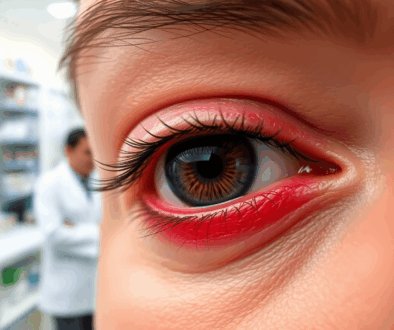Can Pharmacists Prescribe for Skin Conditions? What You Need to Know
Pharmacists have stepped into a new realm of healthcare by participating in prescribing programs tailored for managing skin conditions. This innovative approach allows pharmacists to assess and treat common dermatological issues, offering patients more accessible care pathways.
The involvement of pharmacists in handling skin conditions brings a fresh perspective to healthcare delivery. With their expertise in medications and patient care, pharmacists play a crucial role in ensuring timely access to treatment for various skin ailments.
By bridging the gap between patients and traditional healthcare providers, pharmacists enhance the overall quality of care while easing the burden on primary care physicians.
Let’s dive deeper into the world of pharmacist prescribing programs for skin conditions to unveil the benefits and implications for both patients and healthcare systems.
Pharmacist Prescribing Programs for Skin Conditions
Pharmacist prescribing programs play a crucial role in expanding access to care for various skin conditions. Here’s a breakdown of key points to understand these programs:
1. Overview of Pharmacist Prescribing Programs
Pharmacists can now take on a more active role in managing skin conditions through specific trial programs and pilot schemes. These initiatives aim to enhance patient care by providing timely access to treatment for common dermatological issues.
2. Eligibility Criteria for Patients
Patients seeking care under pharmacist prescribing programs must meet certain eligibility criteria. These criteria may vary depending on the specific skin condition being treated and the requirements set forth by the program.
3. Training Requirements for Pharmacists
Pharmacists participating in these programs undergo specialized training to equip them with the necessary skills and knowledge to assess, diagnose, and manage various skin conditions. This training ensures that pharmacists can provide quality care to patients seeking treatment.
4. List of Common Skin Conditions Managed by Pharmacists
Pharmacists involved in prescribing programs commonly manage skin conditions such as eczema, shingles, impetigo, psoriasis, and more. By expanding their scope of practice, pharmacists can address a wider range of dermatological issues effectively.
These pharmacist prescribing programs represent a significant step towards improving access to care for individuals with skin conditions. By meeting specific eligibility criteria, receiving adequate training, and managing common dermatological issues, pharmacists can make a valuable contribution to the healthcare landscape.
In addition to these programs, it’s also important for patients to understand how to switch pharmacies smoothly without interrupting their medication schedule. This knowledge can be beneficial when transitioning between different pharmacy services or when a patient’s prescribed treatment requires a change in pharmacy provider.
NSW Pharmacy Trial for Skin Conditions: Eczema, Shingles, Impetigo, and Psoriasis
In the NSW Pharmacy Trial, pharmacists are taking a hands-on approach to treating skin conditions. Here’s what you need to know:
1. Covered Skin Conditions
The trial is addressing multiple skin conditions including:
- Eczema
- Shingles
- Impetigo
- Psoriasis
These common skin issues are now being treated by pharmacists.
2. Pharmacists’ Role
Pharmacists are receiving specialized training to effectively manage these conditions. This includes:
- Learning how to accurately diagnose each condition
- Gaining skills in providing consultations and treatment plans
With this additional training, pharmacists will be better equipped to deliver high-quality care to patients.
This trial is significant because it allows pharmacists to expand their scope of practice and provide more comprehensive healthcare services. So if you’re dealing with any of these skin conditions, keep an eye out for participating pharmacies in your area—they may soon become your go-to resource for skincare solutions.
However, it’s important to note that pharmacies are not only about treating skin conditions. They also play a crucial role in providing essential services such as vaccinations. In fact, local Toronto pharmacies will be offering vaccinations for flu and COVID-19 in 2025. This shows the versatility of pharmacies beyond just skincare treatments.
Victorian Pharmacist Prescribing Pilot: Community Pharmacists and Additional Services Provided
In the Victorian pharmacist prescribing pilot program, community pharmacists play a vital role in providing accessible healthcare services beyond just managing skin conditions. Here are the key points to consider:
1. Overview of the Program
The Victorian pharmacist prescribing pilot program extends beyond skin conditions to include [managing urinary tract infections (UTIs)](https://misterpharmacist.com/minor-ailments/urinary-tract-infections-uti/bladder-infection) and supplying contraceptives. Community pharmacists are at the forefront of this initiative, offering a wide range of services to enhance patient care.
2. Role of Community Pharmacists
Community pharmacists are trained to assess and treat UTIs, a common and uncomfortable issue for many patients. By providing this service, pharmacists alleviate the burden on doctors’ offices and emergency departments, ensuring timely access to treatment for UTIs.
3. Additional Services Provided
In addition to UTI management, community pharmacists in the Victorian pilot program also offer contraceptive supply services. This expanded role showcases the versatility of pharmacists in addressing diverse healthcare needs within the community.
By participating in the Victorian pharmacist prescribing pilot program, community pharmacists demonstrate their commitment to enhancing patient outcomes and improving healthcare accessibility. Through services like UTI management and contraceptive supply, pharmacists play a crucial role in delivering comprehensive care beyond traditional medication dispensing.
Moreover, they also provide valuable assistance in [managing allergies with over-the-counter and prescription options](https://misterpharmacist.com/uncategorized/managing-allergies-with-over-the-counter-and-prescription-options-in-2025), further demonstrating their extensive knowledge and capability in handling various health issues.
This pilot program not only benefits patients by offering more accessible healthcare solutions but also highlights the top benefits of choosing a local independent pharmacy over big chains, such as personalized service and better prices.
Patient Experience Under Pharmacist Prescribing Programs: Access to Care and Timely Treatment Benefits
The patient experience under pharmacist prescribing programs is significantly enhanced, marked by improved access to care which alleviates the strain on general practitioners. By providing timely treatment for common skin issues, pharmacists play a crucial role in improving healthcare delivery. Patients benefit from:
- Convenience: Easy access to pharmacists without lengthy wait times typically seen with doctors.
- Efficiency: Quick assessment and treatment initiation, reducing delays in managing skin conditions.
- Accessibility: Increased availability of healthcare services through community pharmacies, especially in underserved areas. This [accessible healthcare](https://misterpharmacist.com/uncategorized/accessible-healthcare-how-pharmacies-are-supporting-mental-health-needs) model also extends to mental health needs, demonstrating the versatility of pharmacist-led initiatives.
- Personalized Care: Tailored consultations focusing on individual skin concerns, promoting patient satisfaction and compliance. This aspect aligns with the concept of [personalized pharmaceutical care](https://misterpharmacist.com/uncategorized/personalized-pharmaceutical-care-the-future-of-patient-centered-service), which is set to revolutionize patient-centered services in the future.
Through pharmacist-led initiatives, patients receive prompt care, easing the burden on primary care providers and ensuring timely intervention for skin conditions. The efficiency of these programs has even opened avenues for pharmacists to assist in more complex areas such as [ADHD medication management](https://misterpharmacist.com/uncategorized/understanding-adhd-medication-options-vyvanse-concerta-and-more) or administering B12 injections for vitamin deficiencies.
Ensuring Patient Safety in Pharmacist Prescribing Programs: Referral Protocols and Clinical Guidelines Compliance
Patient safety is the non-negotiable cornerstone of pharmacist prescribing programs. These initiatives don’t toss pharmacists into the deep end without a life jacket. Instead, they are backed by strict clinical guidelines compliance to ensure treatments align with best practices. Pharmacists undergo specialized training to recognize when a skin condition goes beyond their scope.
Key safety measures include:
- Doctor referral protocols: If a pharmacist spots red flags—say, severe symptoms or unusual presentations—they must refer patients promptly to a physician for further evaluation.
- Standardized assessment tools: These help pharmacists determine eligibility for treatment and identify cases needing escalation.
- Documentation and follow-up: Maintaining detailed records ensures continuity of care and tracks treatment outcomes.
This framework creates a safety net where pharmacists act as frontline assessors, managing straightforward cases efficiently while safeguarding patients through timely medical referrals when complexities arise.
However, it’s not just about managing prescriptions. The delivery of these prescriptions also plays a crucial role in patient safety. Choosing the right method for prescription delivery can significantly impact speed, safety, and convenience.
Moreover, as more patients turn to online platforms for their medication needs, it’s vital to address common misconceptions about online prescription safety. Understanding these aspects can help ensure safer medication use, whether through traditional means or digital platforms.
In addition, public health issues such as measles require an understanding of prevention and treatment strategies. For parents seeking guidance on this matter, our comprehensive guide on understanding measles provides valuable insights.
Cost Considerations and Accessibility in Pharmacist Prescribing Programs: Medicine Costs Variation
When it comes to medicine costs variation, the price tag on pharmacist-prescribed treatments can look quite different depending on where you are. Some regions offer free consultations during the trial period, which is a nice bonus for anyone juggling a busy schedule and a tight budget. However, even if the chat with your friendly pharmacist doesn’t cost a dime, the medications themselves usually do.
Key points to keep in mind:
- Consultation fees: Often waived during trial programs, making initial access easier.
- Medication costs: Still vary regionally and depend on the specific drug prescribed.
- Insurance coverage: May differ for pharmacist prescriptions versus doctor prescriptions.
- Accessibility: Pharmacies tend to be more conveniently located than specialist clinics or GPs, shaving off travel time and wait times.
So, when asking Can Pharmacists Prescribe for Skin Conditions? What You Need to Know, it’s wise to consider not just the convenience but also how the economics stack up for your particular area and treatment needs.
For instance, [managing children’s medications and dosages safely](https://misterpharmacist.com/uncategorized/a-parents-guide-to-managing-childrens-medications-and-dosages-safely) can be quite a task. It requires understanding various aspects of medication management which can be aided by your local pharmacist’s expertise.
Moreover, if you’re dealing with allergies, it’s crucial to know [how to choose the right allergy treatment](https://misterpharmacist.com/allergic-rhinitis-allergies/choose-right-allergy-treatment). Your pharmacist can provide valuable insights into effective allergy treatments that suit your needs.
Lastly, if you ever find yourself needing to transfer prescriptions, it’s good to know what to expect when transferring your prescriptions to an online pharmacy. This knowledge can help you save costs while enjoying convenient delivery and pharmacist support.
Conclusion: Expanding Role of Pharmacists in Skin Condition Management and Improving Access to Treatment
Pharmacists are stepping up as frontline healthcare heroes for skin conditions. Their expanding role means quicker access to care for common issues like eczema, shingles, impetigo, and psoriasis. This shift eases the load on doctors while giving patients timely treatment options without the usual wait times.
Pharmacist prescribing programs combine expert training with clinical guidelines to keep patient safety front and centre. Referral systems ensure that if a skin condition needs extra attention, you’re swiftly directed to the right specialist. This blend of accessibility and safety is changing how we think about managing minor skin ailments.
Consider MisterPharmacist Pharmacy in Toronto for a Better Pharmacy Experience!
If you’re in downtown Toronto and wondering, Can pharmacists prescribe for skin conditions?—the answer is yes, especially at places like MisterPharmacist pharmacy. This isn’t just any pharmacy; it’s Toronto’s only 5-star Google-rated pharmacy, known for smooth service and knowledgeable staff who make switching nearly effortless.
MisterPharmacist is not just about prescriptions; they offer a range of services including same-day prescription delivery, which significantly improves medication access and patient convenience.
Think of MisterPharmacist as your skin’s new best friend—ready to help you skip the wait, get proper treatment, and feel confident in your care. When it comes to managing your skin health, this is where convenience meets expertise.



